Analyzing Fate: Destiny's Impact on Hamlet's Character Development.
VerifiedAdded on 2023/05/29
|6
|1499
|270
Essay
AI Summary
This essay delves into the significant role of fate and destiny in shaping the character of Hamlet within Shakespeare's renowned tragedy. It argues that while Hamlet possesses remarkable qualities, his tragic flaw of indecision, coupled with external circumstances orchestrated by fate, contribute to his downfall. The appearance of the ghost, the near-accident at sea, and the accidental murder of Polonius are presented as key instances where fate intervenes, steering Hamlet towards his tragic end. The essay further explores Hamlet's brooding nature and his internal conflicts, highlighting his struggle to reconcile his thoughts with his actions. Ultimately, Hamlet's realization of the power of fate leads him to accept his destiny, underscoring the interplay between character and fate in the play's tragic outcome. Desklib provides a platform to access similar essays and study resources for students.
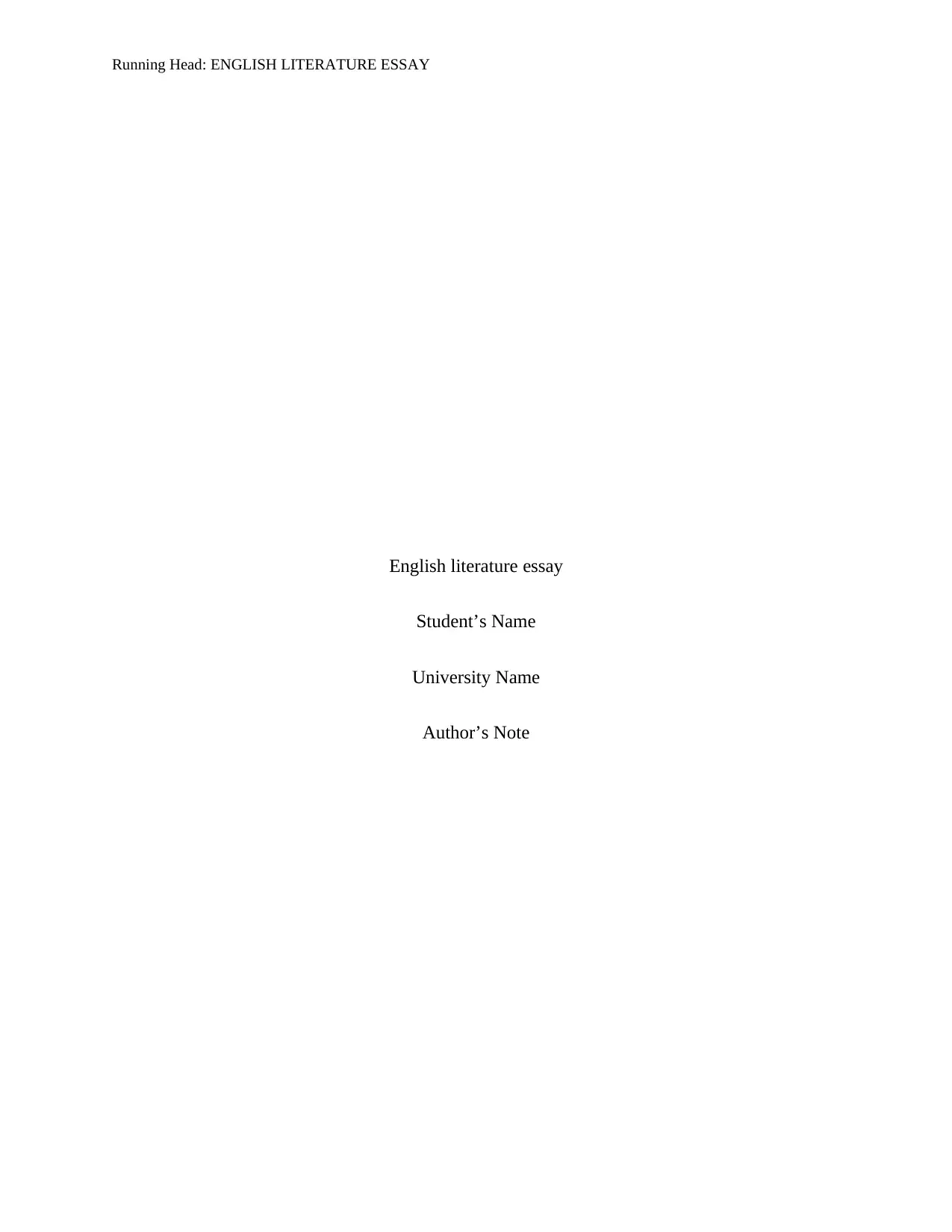
Running Head: ENGLISH LITERATURE ESSAY
English literature essay
Student’s Name
University Name
Author’s Note
English literature essay
Student’s Name
University Name
Author’s Note
Paraphrase This Document
Need a fresh take? Get an instant paraphrase of this document with our AI Paraphraser
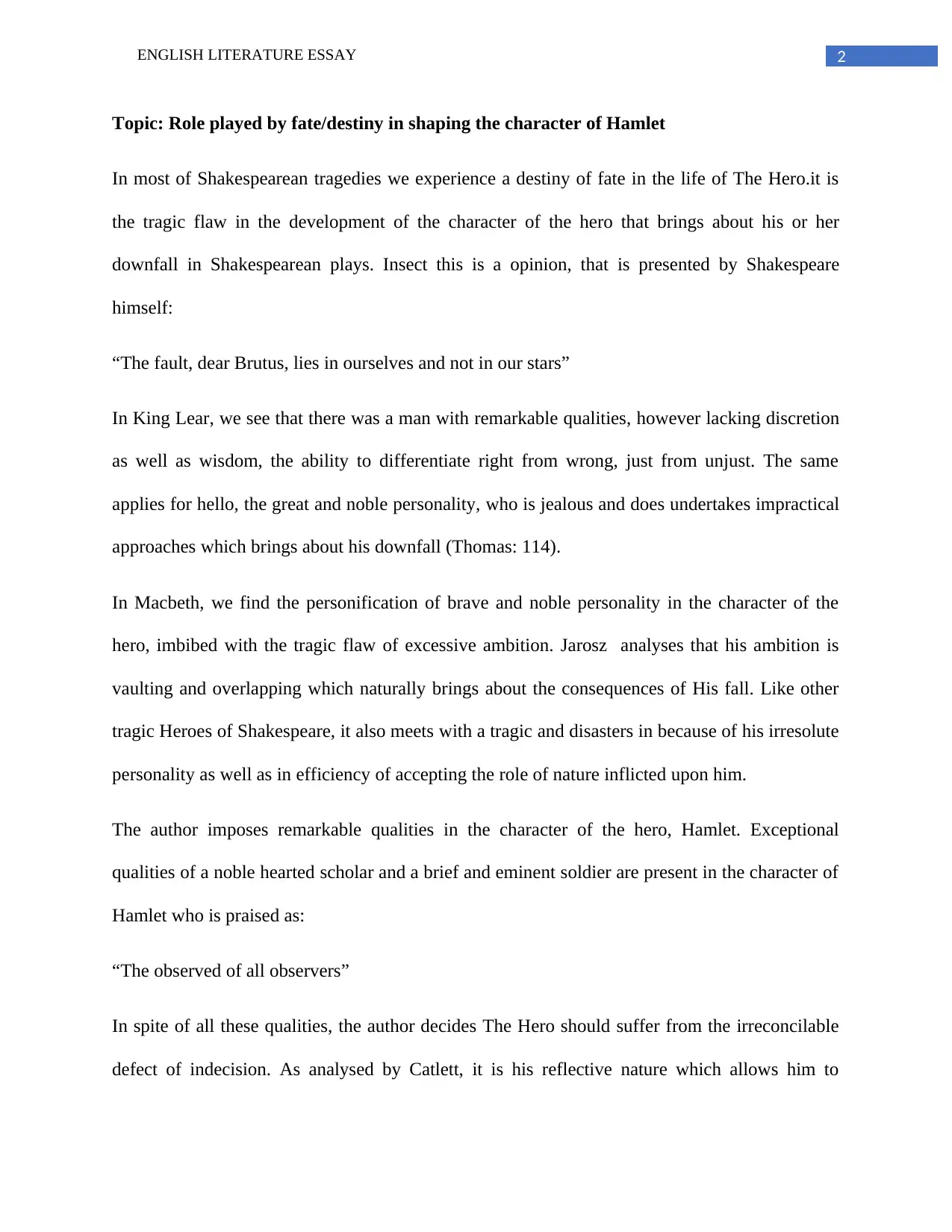
2ENGLISH LITERATURE ESSAY
Topic: Role played by fate/destiny in shaping the character of Hamlet
In most of Shakespearean tragedies we experience a destiny of fate in the life of The Hero.it is
the tragic flaw in the development of the character of the hero that brings about his or her
downfall in Shakespearean plays. Insect this is a opinion, that is presented by Shakespeare
himself:
“The fault, dear Brutus, lies in ourselves and not in our stars”
In King Lear, we see that there was a man with remarkable qualities, however lacking discretion
as well as wisdom, the ability to differentiate right from wrong, just from unjust. The same
applies for hello, the great and noble personality, who is jealous and does undertakes impractical
approaches which brings about his downfall (Thomas: 114).
In Macbeth, we find the personification of brave and noble personality in the character of the
hero, imbibed with the tragic flaw of excessive ambition. Jarosz analyses that his ambition is
vaulting and overlapping which naturally brings about the consequences of His fall. Like other
tragic Heroes of Shakespeare, it also meets with a tragic and disasters in because of his irresolute
personality as well as in efficiency of accepting the role of nature inflicted upon him.
The author imposes remarkable qualities in the character of the hero, Hamlet. Exceptional
qualities of a noble hearted scholar and a brief and eminent soldier are present in the character of
Hamlet who is praised as:
“The observed of all observers”
In spite of all these qualities, the author decides The Hero should suffer from the irreconcilable
defect of indecision. As analysed by Catlett, it is his reflective nature which allows him to
Topic: Role played by fate/destiny in shaping the character of Hamlet
In most of Shakespearean tragedies we experience a destiny of fate in the life of The Hero.it is
the tragic flaw in the development of the character of the hero that brings about his or her
downfall in Shakespearean plays. Insect this is a opinion, that is presented by Shakespeare
himself:
“The fault, dear Brutus, lies in ourselves and not in our stars”
In King Lear, we see that there was a man with remarkable qualities, however lacking discretion
as well as wisdom, the ability to differentiate right from wrong, just from unjust. The same
applies for hello, the great and noble personality, who is jealous and does undertakes impractical
approaches which brings about his downfall (Thomas: 114).
In Macbeth, we find the personification of brave and noble personality in the character of the
hero, imbibed with the tragic flaw of excessive ambition. Jarosz analyses that his ambition is
vaulting and overlapping which naturally brings about the consequences of His fall. Like other
tragic Heroes of Shakespeare, it also meets with a tragic and disasters in because of his irresolute
personality as well as in efficiency of accepting the role of nature inflicted upon him.
The author imposes remarkable qualities in the character of the hero, Hamlet. Exceptional
qualities of a noble hearted scholar and a brief and eminent soldier are present in the character of
Hamlet who is praised as:
“The observed of all observers”
In spite of all these qualities, the author decides The Hero should suffer from the irreconcilable
defect of indecision. As analysed by Catlett, it is his reflective nature which allows him to
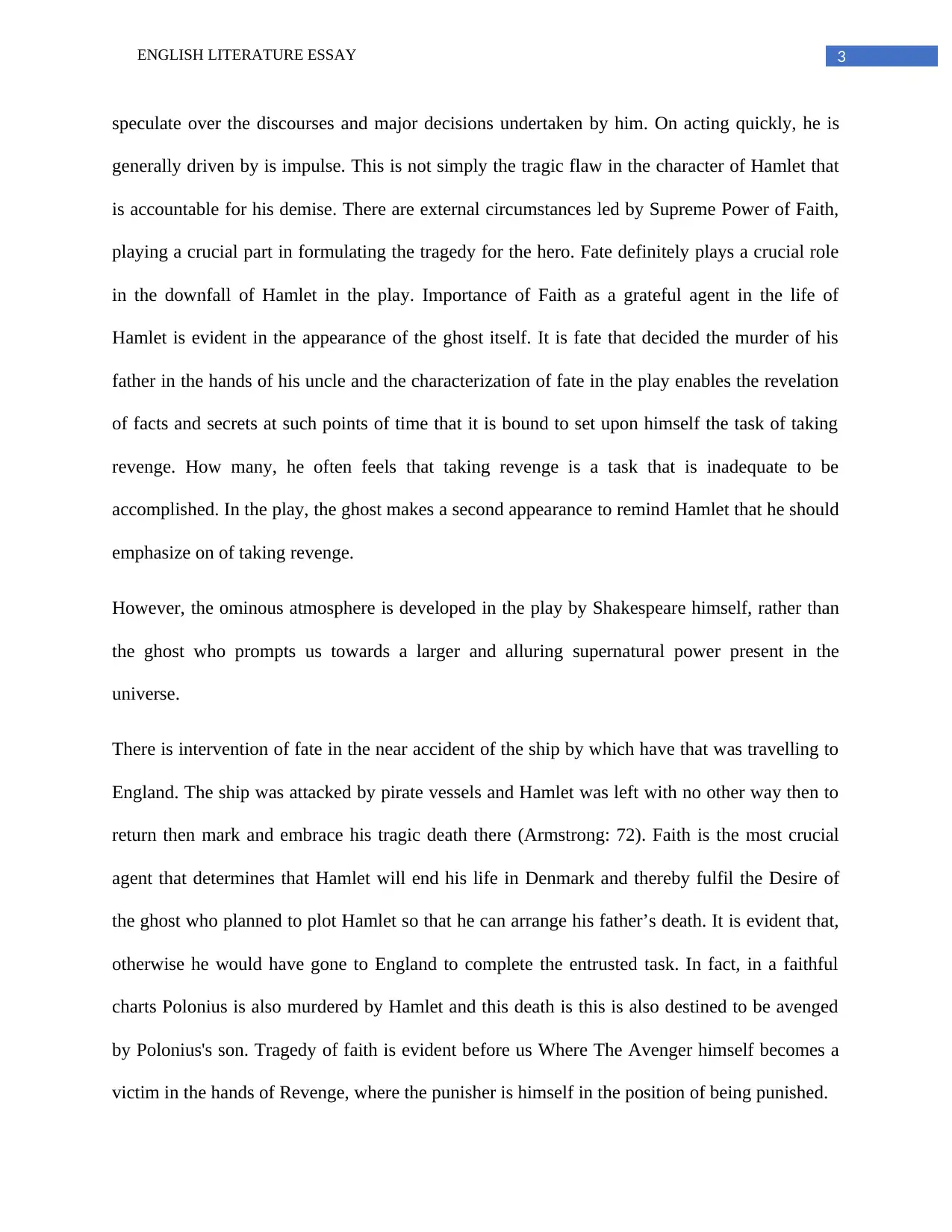
3ENGLISH LITERATURE ESSAY
speculate over the discourses and major decisions undertaken by him. On acting quickly, he is
generally driven by is impulse. This is not simply the tragic flaw in the character of Hamlet that
is accountable for his demise. There are external circumstances led by Supreme Power of Faith,
playing a crucial part in formulating the tragedy for the hero. Fate definitely plays a crucial role
in the downfall of Hamlet in the play. Importance of Faith as a grateful agent in the life of
Hamlet is evident in the appearance of the ghost itself. It is fate that decided the murder of his
father in the hands of his uncle and the characterization of fate in the play enables the revelation
of facts and secrets at such points of time that it is bound to set upon himself the task of taking
revenge. How many, he often feels that taking revenge is a task that is inadequate to be
accomplished. In the play, the ghost makes a second appearance to remind Hamlet that he should
emphasize on of taking revenge.
However, the ominous atmosphere is developed in the play by Shakespeare himself, rather than
the ghost who prompts us towards a larger and alluring supernatural power present in the
universe.
There is intervention of fate in the near accident of the ship by which have that was travelling to
England. The ship was attacked by pirate vessels and Hamlet was left with no other way then to
return then mark and embrace his tragic death there (Armstrong: 72). Faith is the most crucial
agent that determines that Hamlet will end his life in Denmark and thereby fulfil the Desire of
the ghost who planned to plot Hamlet so that he can arrange his father’s death. It is evident that,
otherwise he would have gone to England to complete the entrusted task. In fact, in a faithful
charts Polonius is also murdered by Hamlet and this death is this is also destined to be avenged
by Polonius's son. Tragedy of faith is evident before us Where The Avenger himself becomes a
victim in the hands of Revenge, where the punisher is himself in the position of being punished.
speculate over the discourses and major decisions undertaken by him. On acting quickly, he is
generally driven by is impulse. This is not simply the tragic flaw in the character of Hamlet that
is accountable for his demise. There are external circumstances led by Supreme Power of Faith,
playing a crucial part in formulating the tragedy for the hero. Fate definitely plays a crucial role
in the downfall of Hamlet in the play. Importance of Faith as a grateful agent in the life of
Hamlet is evident in the appearance of the ghost itself. It is fate that decided the murder of his
father in the hands of his uncle and the characterization of fate in the play enables the revelation
of facts and secrets at such points of time that it is bound to set upon himself the task of taking
revenge. How many, he often feels that taking revenge is a task that is inadequate to be
accomplished. In the play, the ghost makes a second appearance to remind Hamlet that he should
emphasize on of taking revenge.
However, the ominous atmosphere is developed in the play by Shakespeare himself, rather than
the ghost who prompts us towards a larger and alluring supernatural power present in the
universe.
There is intervention of fate in the near accident of the ship by which have that was travelling to
England. The ship was attacked by pirate vessels and Hamlet was left with no other way then to
return then mark and embrace his tragic death there (Armstrong: 72). Faith is the most crucial
agent that determines that Hamlet will end his life in Denmark and thereby fulfil the Desire of
the ghost who planned to plot Hamlet so that he can arrange his father’s death. It is evident that,
otherwise he would have gone to England to complete the entrusted task. In fact, in a faithful
charts Polonius is also murdered by Hamlet and this death is this is also destined to be avenged
by Polonius's son. Tragedy of faith is evident before us Where The Avenger himself becomes a
victim in the hands of Revenge, where the punisher is himself in the position of being punished.
⊘ This is a preview!⊘
Do you want full access?
Subscribe today to unlock all pages.

Trusted by 1+ million students worldwide
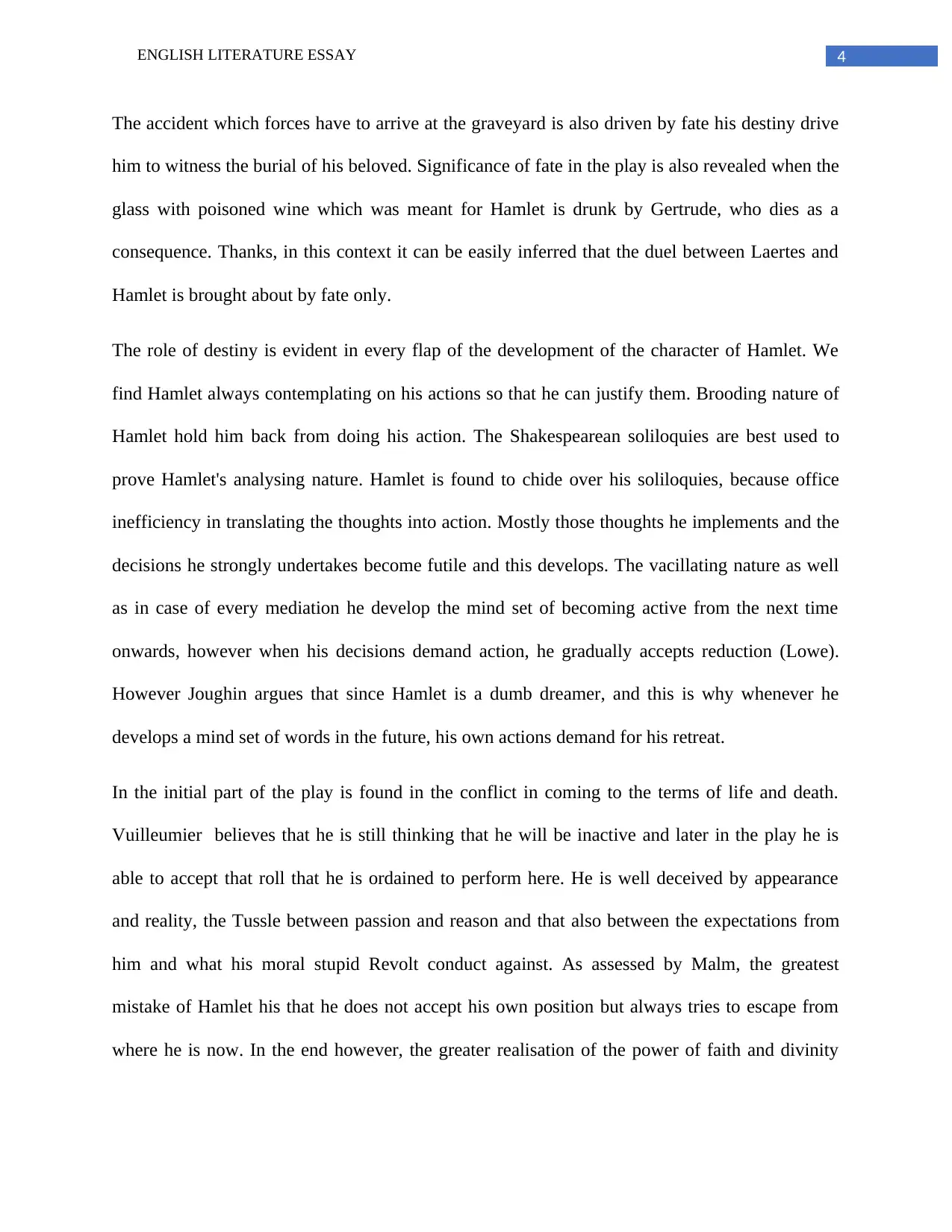
4ENGLISH LITERATURE ESSAY
The accident which forces have to arrive at the graveyard is also driven by fate his destiny drive
him to witness the burial of his beloved. Significance of fate in the play is also revealed when the
glass with poisoned wine which was meant for Hamlet is drunk by Gertrude, who dies as a
consequence. Thanks, in this context it can be easily inferred that the duel between Laertes and
Hamlet is brought about by fate only.
The role of destiny is evident in every flap of the development of the character of Hamlet. We
find Hamlet always contemplating on his actions so that he can justify them. Brooding nature of
Hamlet hold him back from doing his action. The Shakespearean soliloquies are best used to
prove Hamlet's analysing nature. Hamlet is found to chide over his soliloquies, because office
inefficiency in translating the thoughts into action. Mostly those thoughts he implements and the
decisions he strongly undertakes become futile and this develops. The vacillating nature as well
as in case of every mediation he develop the mind set of becoming active from the next time
onwards, however when his decisions demand action, he gradually accepts reduction (Lowe).
However Joughin argues that since Hamlet is a dumb dreamer, and this is why whenever he
develops a mind set of words in the future, his own actions demand for his retreat.
In the initial part of the play is found in the conflict in coming to the terms of life and death.
Vuilleumier believes that he is still thinking that he will be inactive and later in the play he is
able to accept that roll that he is ordained to perform here. He is well deceived by appearance
and reality, the Tussle between passion and reason and that also between the expectations from
him and what his moral stupid Revolt conduct against. As assessed by Malm, the greatest
mistake of Hamlet his that he does not accept his own position but always tries to escape from
where he is now. In the end however, the greater realisation of the power of faith and divinity
The accident which forces have to arrive at the graveyard is also driven by fate his destiny drive
him to witness the burial of his beloved. Significance of fate in the play is also revealed when the
glass with poisoned wine which was meant for Hamlet is drunk by Gertrude, who dies as a
consequence. Thanks, in this context it can be easily inferred that the duel between Laertes and
Hamlet is brought about by fate only.
The role of destiny is evident in every flap of the development of the character of Hamlet. We
find Hamlet always contemplating on his actions so that he can justify them. Brooding nature of
Hamlet hold him back from doing his action. The Shakespearean soliloquies are best used to
prove Hamlet's analysing nature. Hamlet is found to chide over his soliloquies, because office
inefficiency in translating the thoughts into action. Mostly those thoughts he implements and the
decisions he strongly undertakes become futile and this develops. The vacillating nature as well
as in case of every mediation he develop the mind set of becoming active from the next time
onwards, however when his decisions demand action, he gradually accepts reduction (Lowe).
However Joughin argues that since Hamlet is a dumb dreamer, and this is why whenever he
develops a mind set of words in the future, his own actions demand for his retreat.
In the initial part of the play is found in the conflict in coming to the terms of life and death.
Vuilleumier believes that he is still thinking that he will be inactive and later in the play he is
able to accept that roll that he is ordained to perform here. He is well deceived by appearance
and reality, the Tussle between passion and reason and that also between the expectations from
him and what his moral stupid Revolt conduct against. As assessed by Malm, the greatest
mistake of Hamlet his that he does not accept his own position but always tries to escape from
where he is now. In the end however, the greater realisation of the power of faith and divinity
Paraphrase This Document
Need a fresh take? Get an instant paraphrase of this document with our AI Paraphraser
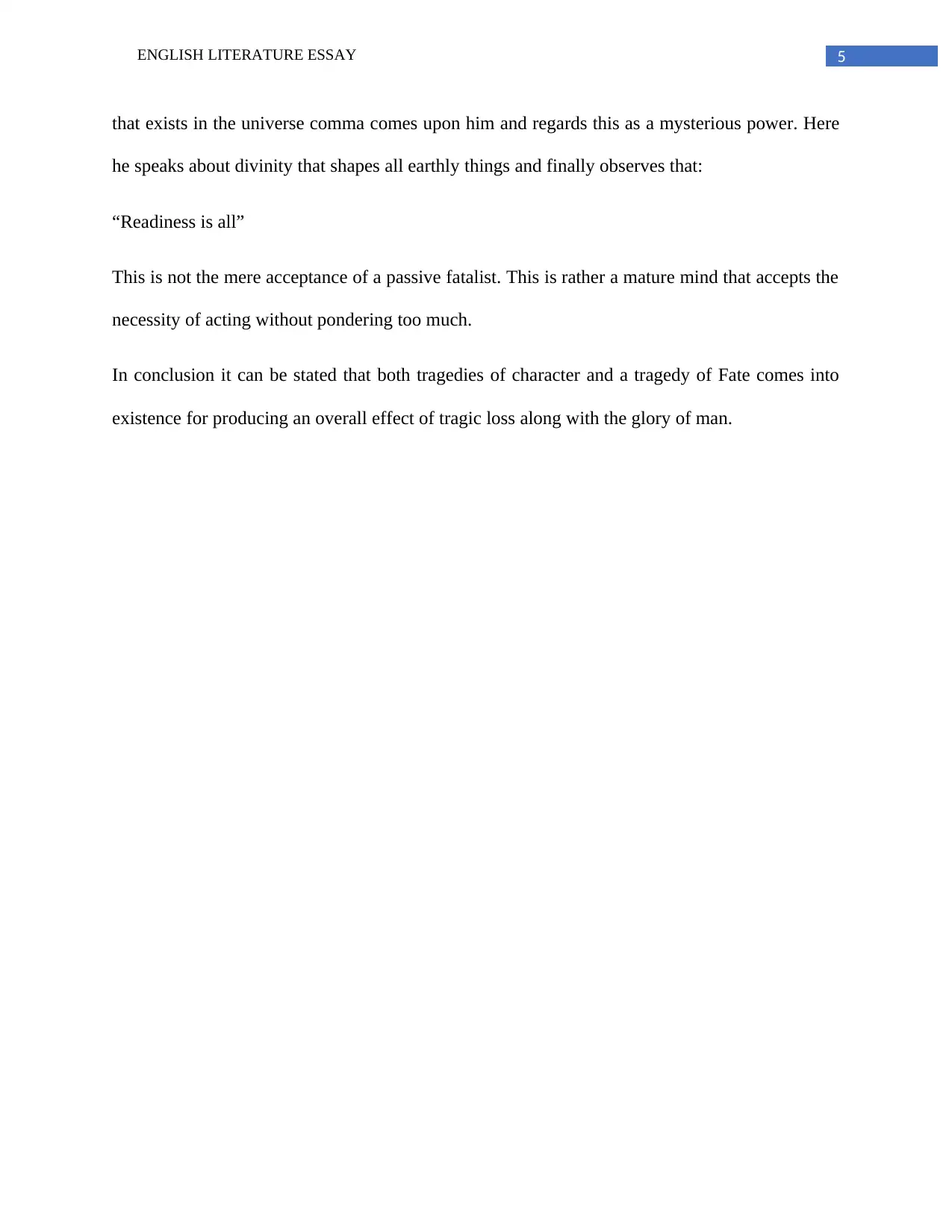
5ENGLISH LITERATURE ESSAY
that exists in the universe comma comes upon him and regards this as a mysterious power. Here
he speaks about divinity that shapes all earthly things and finally observes that:
“Readiness is all”
This is not the mere acceptance of a passive fatalist. This is rather a mature mind that accepts the
necessity of acting without pondering too much.
In conclusion it can be stated that both tragedies of character and a tragedy of Fate comes into
existence for producing an overall effect of tragic loss along with the glory of man.
that exists in the universe comma comes upon him and regards this as a mysterious power. Here
he speaks about divinity that shapes all earthly things and finally observes that:
“Readiness is all”
This is not the mere acceptance of a passive fatalist. This is rather a mature mind that accepts the
necessity of acting without pondering too much.
In conclusion it can be stated that both tragedies of character and a tragedy of Fate comes into
existence for producing an overall effect of tragic loss along with the glory of man.
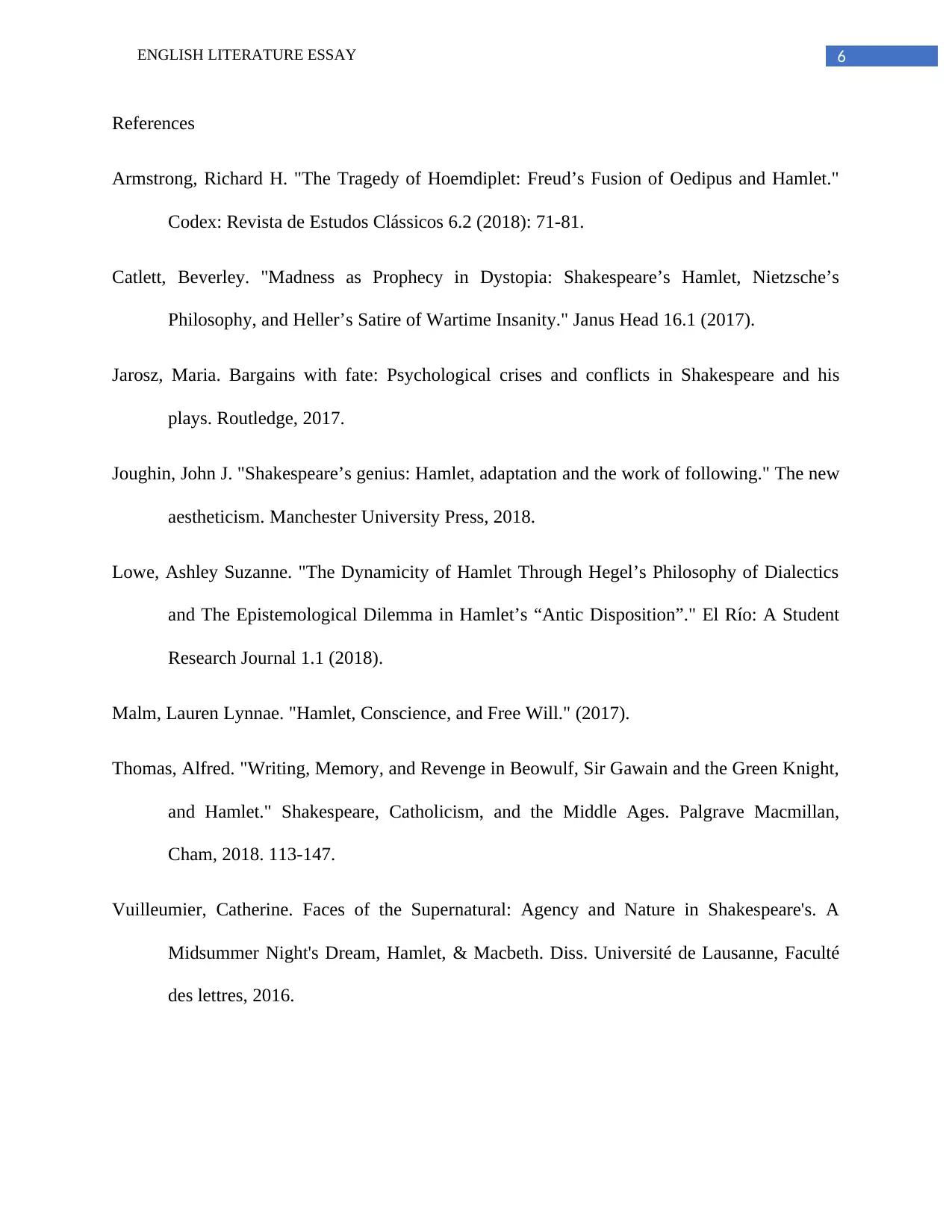
6ENGLISH LITERATURE ESSAY
References
Armstrong, Richard H. "The Tragedy of Hoemdiplet: Freud’s Fusion of Oedipus and Hamlet."
Codex: Revista de Estudos Clássicos 6.2 (2018): 71-81.
Catlett, Beverley. "Madness as Prophecy in Dystopia: Shakespeare’s Hamlet, Nietzsche’s
Philosophy, and Heller’s Satire of Wartime Insanity." Janus Head 16.1 (2017).
Jarosz, Maria. Bargains with fate: Psychological crises and conflicts in Shakespeare and his
plays. Routledge, 2017.
Joughin, John J. "Shakespeare’s genius: Hamlet, adaptation and the work of following." The new
aestheticism. Manchester University Press, 2018.
Lowe, Ashley Suzanne. "The Dynamicity of Hamlet Through Hegel’s Philosophy of Dialectics
and The Epistemological Dilemma in Hamlet’s “Antic Disposition”." El Río: A Student
Research Journal 1.1 (2018).
Malm, Lauren Lynnae. "Hamlet, Conscience, and Free Will." (2017).
Thomas, Alfred. "Writing, Memory, and Revenge in Beowulf, Sir Gawain and the Green Knight,
and Hamlet." Shakespeare, Catholicism, and the Middle Ages. Palgrave Macmillan,
Cham, 2018. 113-147.
Vuilleumier, Catherine. Faces of the Supernatural: Agency and Nature in Shakespeare's. A
Midsummer Night's Dream, Hamlet, & Macbeth. Diss. Université de Lausanne, Faculté
des lettres, 2016.
References
Armstrong, Richard H. "The Tragedy of Hoemdiplet: Freud’s Fusion of Oedipus and Hamlet."
Codex: Revista de Estudos Clássicos 6.2 (2018): 71-81.
Catlett, Beverley. "Madness as Prophecy in Dystopia: Shakespeare’s Hamlet, Nietzsche’s
Philosophy, and Heller’s Satire of Wartime Insanity." Janus Head 16.1 (2017).
Jarosz, Maria. Bargains with fate: Psychological crises and conflicts in Shakespeare and his
plays. Routledge, 2017.
Joughin, John J. "Shakespeare’s genius: Hamlet, adaptation and the work of following." The new
aestheticism. Manchester University Press, 2018.
Lowe, Ashley Suzanne. "The Dynamicity of Hamlet Through Hegel’s Philosophy of Dialectics
and The Epistemological Dilemma in Hamlet’s “Antic Disposition”." El Río: A Student
Research Journal 1.1 (2018).
Malm, Lauren Lynnae. "Hamlet, Conscience, and Free Will." (2017).
Thomas, Alfred. "Writing, Memory, and Revenge in Beowulf, Sir Gawain and the Green Knight,
and Hamlet." Shakespeare, Catholicism, and the Middle Ages. Palgrave Macmillan,
Cham, 2018. 113-147.
Vuilleumier, Catherine. Faces of the Supernatural: Agency and Nature in Shakespeare's. A
Midsummer Night's Dream, Hamlet, & Macbeth. Diss. Université de Lausanne, Faculté
des lettres, 2016.
⊘ This is a preview!⊘
Do you want full access?
Subscribe today to unlock all pages.

Trusted by 1+ million students worldwide
1 out of 6
Related Documents
Your All-in-One AI-Powered Toolkit for Academic Success.
+13062052269
info@desklib.com
Available 24*7 on WhatsApp / Email
![[object Object]](/_next/static/media/star-bottom.7253800d.svg)
Unlock your academic potential
Copyright © 2020–2025 A2Z Services. All Rights Reserved. Developed and managed by ZUCOL.





